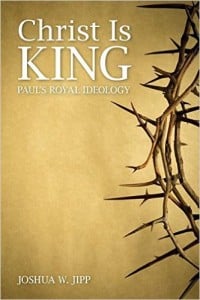 Josh responses to my engagement with his chapter three in Christ Is King: Paul’s Royal Ideology.
Josh responses to my engagement with his chapter three in Christ Is King: Paul’s Royal Ideology.
–
I’m glad to hear that reading the book is providing further confidence in your own approach to Pauline Christology! I’m looking forward to seeing the reception of chapter 3 given the dominance of understanding Paul’s Christ-hymns (esp. Col. 1) in light of Hellenistic Jewish speculation on Wisdom and Middle Platonic notions of the Logos. You jump in on the exchange between Crispin and me on his blog post. I assume we’ll all continue to engage on this matter in years to come.
As both you and Crispin note, I do not take up the notion of a priestly messiah. Although at the end I do say: “Given that my study has been more illustrative than comprehensive, further studies might examine with profit Paul’s use of priestly metaphors (Rom. 12:1-2; 15:14-29) and his depiction of the church as sacred temple (1 Cor. 3:16; 6:19; 2 Cor. 6:14-7:1; Eph. 2:19-22) in light of the notion of the king as priestly figure and temple builder” (p. 275). I’m not sure how much is really there on this for Paul, but then again I haven’t read Crispin’s book yet and perhaps I’ll be surprised.
You do again mention that our disagreements – even if minor – have largely centered upon my speaking of kingship ideologies in a way that incorporates both Hellenistic and Roman kingship and Jewish messianism, even though as you rightly recognize, I do give primacy to the Greek Old Testament as providing the sources, scripts, and explicit texts for Paul’s kingship language.
As something of a thought experiment, let me mention very, very briefly what I would not have seen in my study of Col. 1 and Phil. 2 if I had focused singularly on the Greek Old Testament.
- I would not have known of the existence of a specific genre of prose composition that set forth how to praise kings and emperors (see here Menander, Quintilian, Aelius Theon, Aphthonius, and others).
- I would not have understood nearly as well that hymns functioned as a form of cultic praise as a form of bestowing divine honors in exchange for powerful and god-like gifts and benefactions.
- I do not think I would have seen or have been convinced of the importance of the head-body language (Col. 1:18a) unless I had seen its prevalence in imperial discourse (close in time to Paul), such as Seneca says to Nero: he is “the bond by which the commonwealth is united, the breath of life which these many thousands draw” (De Clementia 1.4.1); “the commonwealth needs the head” (1.4.2-3); “the gentleness of your mind will be transmitted to others…it will be diffused over the whole body of the empire, and all will be formed in your likeness for health springs form the head” (2.21). The same argument goes for understanding the language of “reconciliation” and “making peace” (1:20) as well as “celebration of a triumph” (2:15) – both of which seem to derive from Hellenistic-Roman kingship ideology (I hesitate to even say it….) and not a Davidic one!
- I don’t think I would have seen how the depiction of Christ in Phil. 2:6-8 depicts Christ as an ideal ruler who rejects the pursuit of god-like status as an act of hubris. Maybe I would have seen it from looking at texts like 2 Macc 9 and Isaiah 14 and 28, but I think I needed to see this trope in depictions of hubristic emperors who were criticized for striving for god-like honors (see esp. Samuel Vollenweider here).
I’m definitely enjoying the level of agreement that we have on these matters, Joel! But I think you’re right that we’re discovering one area of difference. I certainly think that Paul’s belief that Jesus is Israel’s Messiah is the catalyst that causes him to rework and appropriate the Greek Old Testament (and Messiah-texts) in his depiction of Christ and this is clearly evident – as you note – in places like Rom. 1:1-5; 15:7-13; 1 Cor. 15:20-28; 2 Tim. 2:8; and on and on.
But I hesitate to call his Christology “Davidic” for at least two reasons: 1) That language can give the appearance that Paul is simply applying Davidic motifs and language to Christ when, in reality, those Davidic motifs, scripts, stories, and texts are transformed by the Christ-event; 2) As I’ve indicated, it seems to me that – even if pride of place goes to the Greek Old Testament (which will come across even more clearly in chs. 4 and 5, I think), Paul’s belief that Jesus is the King enables him to use, rework, and transform other royal ideologies in service of his depiction of Christ.
By the way, your last example regarding the Psalms of Solomon is really interesting! You’re probably right to smack me around for not doing more with that.














